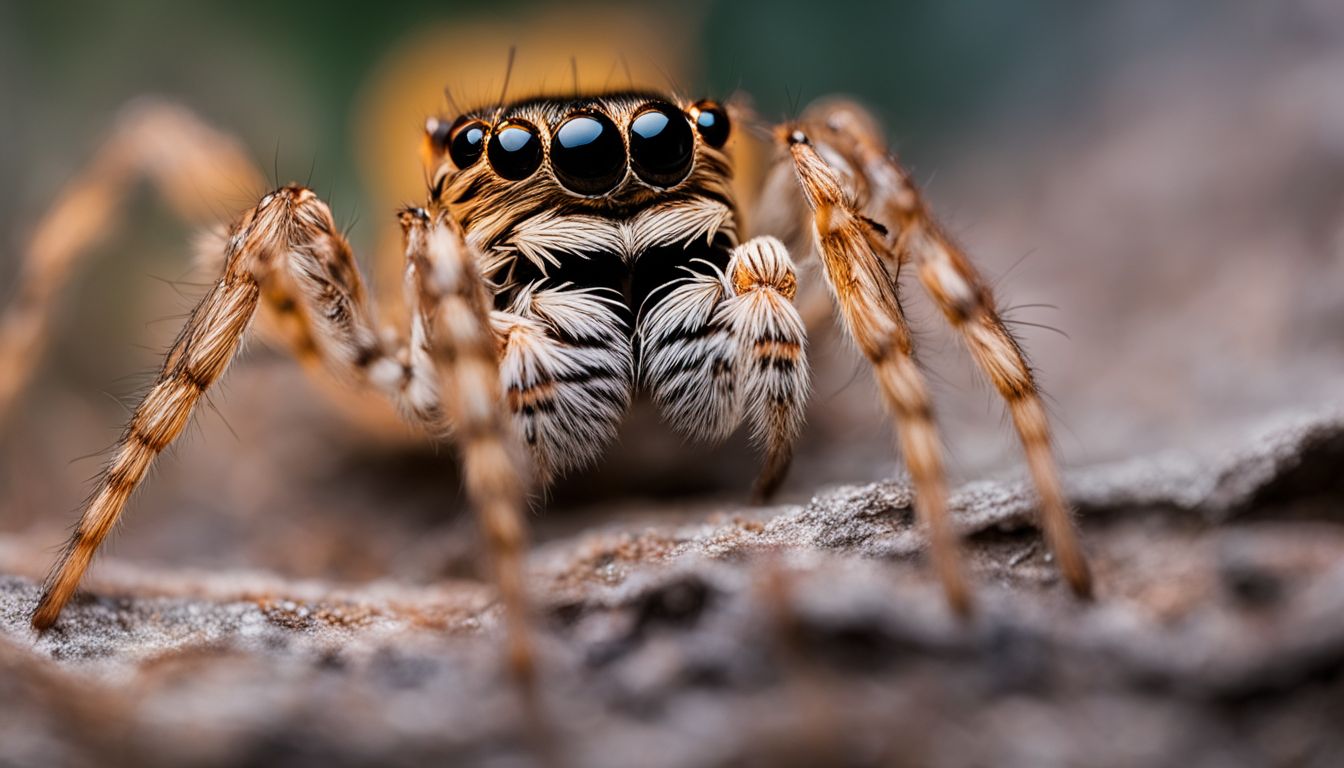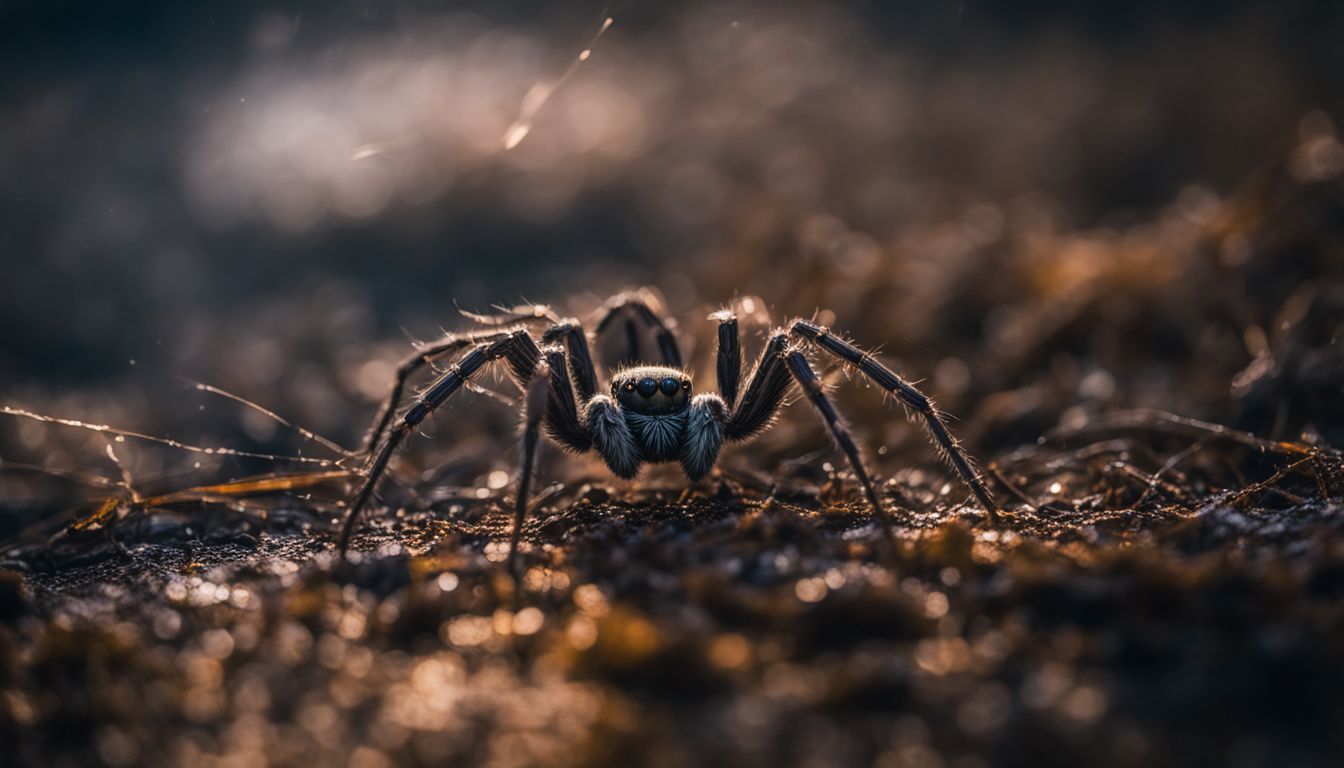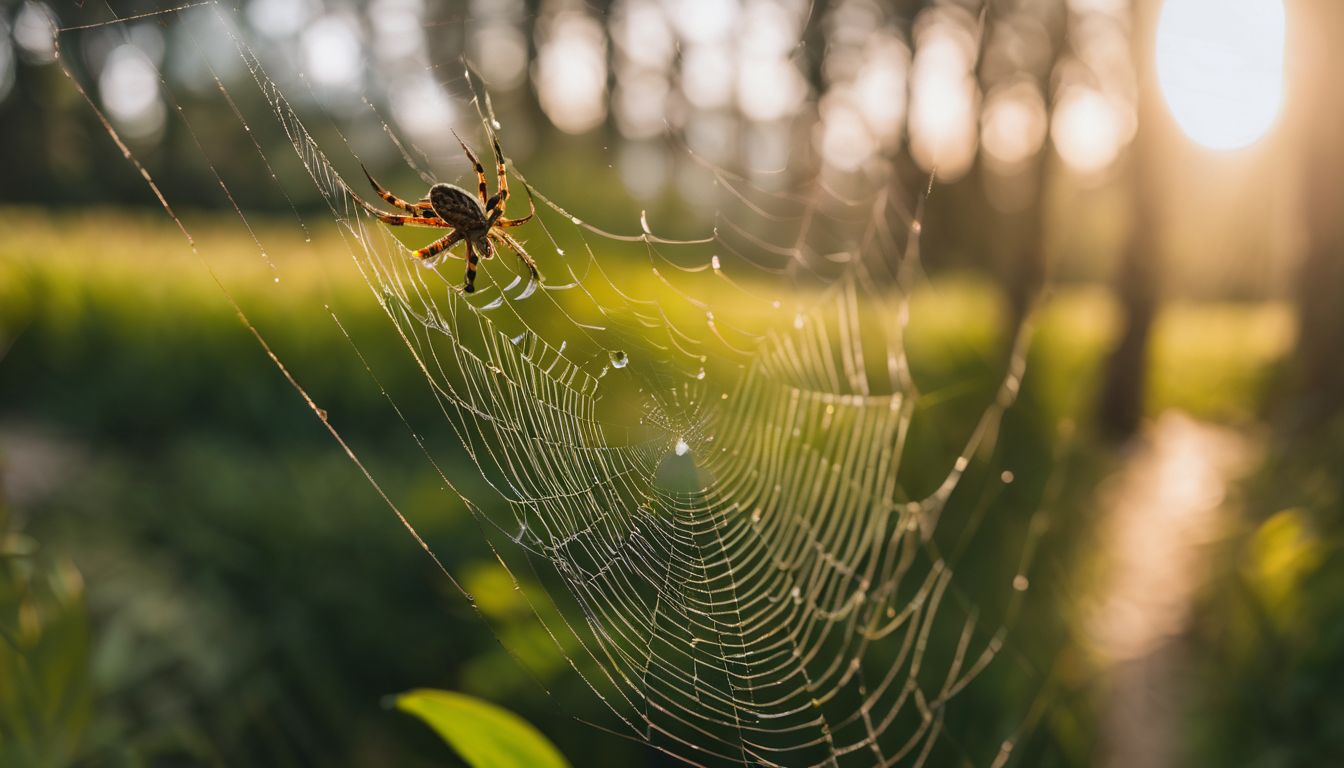Have you ever noticed tiny spots around your home and wondered if spiders are the culprits behind them? Interestingly, spiders do have a unique way of excreting waste that’s different from many other creatures.
This article will dive into the fascinating world of spider biology to reveal just how these eight-legged creatures handle their business. Discover the secrets of spider “bathroom habits” below!
Key Takeaways
- Spiders do poop, and their waste is usually small, dark spots or smears found near their webs or resting areas.
- Spider droppings are part of nature’s cleanup crew, helping to take care of what’s left after spiders enjoy their meals.
- Spider poop can potentially contain harmful pathogens and toxins, so it’s important to clean and prevent exposure to spider droppings in your home.
- Recognizing spider droppings can indicate a possible infestation, and understanding the characteristics of these droppings helps with effective pest control measures.
Unraveling the Mystery: Do Spiders Poop?

Let’s delve into the intriguing question of whether spiders poop or not. We’ll explore the digestive process of spiders and look for evidence of spider excretion to uncover the truth.
The Digestive Process of Spiders
Spiders have a special way of eating their food. They spit up juices to break down bugs like moths, wasps, and caterpillars right where they catch them. Then spiders suck up the soft parts after these juices turn the prey into a liquid meal.
This kind of eating is because they can’t chew like we do.
After a spider eats, it must get rid of waste just like people do. The left-over bits that can’t be used go through the spider’s body and come out as poop. Spider droppings are part of nature’s cleanup crew, helping to take care of what’s left after these tiny hunters enjoy their meals.
Evidence of Spider Excretion
Many people wonder if the tiny creatures in their homes leave behind any waste. Well, spiders do have a way of getting rid of what they don’t need. Their bodies turn food into thick liquid droppings that come out from their anal opening.
This is how they keep clean on the inside. The waste is mostly left over from the spider’s stomach and what it can’t use.
These droppings are dark and sticky, showing us that spiders indeed poop. They aren’t as harmful as some other pests’ poop, but they sure can make a mess on your stuff. And even though these little spots may look bad, they’re not known to carry sicknesses which is good news for us! Next up, let’s talk about what spider waste actually looks like.
Characteristics of Spider Waste

Spider waste, also known as spider poop, is usually small in size and can vary in color depending on the type of prey consumed by the spider. It can often be found near their webs or resting areas.
What Does Spider Poop Look Like?
Spider poop may surprise you because it doesn’t look like what comes out of most animals. It appears as small, dark spots or smears on walls and other surfaces where spiders live and crawl.
These stains can be round pellets or even tube-like shapes. The color is usually a dark brown or black because spiders eat insects, and that’s what gets turned into the thick liquid droppings they leave behind.
If you see these types of marks in corners or under furniture, it might just be spider waste!
Where to Find Spider Droppings
Spider droppings can be found in various places where spiders are active. Look for them on walls, floors, and other surfaces that spiders frequent. Keeping an eye out for these small dark spots can help identify areas where spiders have been present.
Identifying spider droppings is important as it could indicate a spider infestation in your home. Understanding the characteristics of these droppings helps with effective pest control measures to keep your home free from spiders.
Let’s delve into the digestive process of spiders and unravel the mystery behind their poop.
Assessing the Risks: Is Spider Poop Dangerous?
Spider poop can potentially contain harmful pathogens and toxins, posing a health risk if not properly managed. It’s important to be aware of the potential dangers and take measures to prevent exposure to spider droppings in your home.
Potential Health Concerns
Spider droppings are potentially dangerous and should be treated as toxic. Research has shown that spider poop may contain toxins or pathogenic bacteria, posing health risks to humans.
However, some studies suggest that certain spiders have antimicrobial properties in their venom and blood, which may explain the lack of harmful pathogens in their droppings.
Diarrhea or other signs of illness in spiders can indicate various health concerns for these creatures. While spider droppings do not appear to carry harmful pathogens, it is essential to take precautionary measures when encountering them due to the potential health risks associated with handling spider excrement.
Cleaning and Prevention Tips
To clean and prevent spider droppings, follow these simple tips:
- Promptly wipe fresh spider droppings using a damp cloth or paper towel.
- Mix a solution of water and bleach to clean surfaces affected by spider droppings. Use caution and follow safety instructions when working with bleach solutions.
Spider Droppings and Infestation Signs
Spider droppings can serve as a sign of infestation in your home, especially if you notice an abundance of them in certain areas. It’s essential to recognize these signs and take appropriate action to address the issue.
Recognizing Infestation Through Droppings
Spider droppings can indicate a possible infestation and are important to recognize. Here are some ways to identify an infestation through droppings:
- Spider poop tends to be dark brown in color and has a gritty texture when touched.
- Droppings often show up in different places, which could signal an infestation.
- Look for other signs of pest activity along with the spider droppings, such as tracks, gnaw marks, and damaged food or property.
- Spider Senses and Excretion
Spider Senses and Excretion
Explore how spiders use their senses to detect and manage their excretion process, including potential connections between smell and waste disposal.
Curious to learn more about the mysterious world of spider biology? Keep reading to uncover fascinating insights into spider poop and its impact!
Can Spiders Smell??
Spiders have a strong sense of smell, helping them find mates and detect prey. This sense plays a crucial role in their survival and behavior. Most spiders rely heavily on vibration, smell, touch, and taste instead of vision.
Conclusion
In conclusion, spiders do poop, but it’s not like human waste. The white substance they release is solid and doesn’t dissolve in water. Their cleanliness distinguishes them from other pests.
Understanding spider waste can help identify infestations and take necessary precautions for health and hygiene.
To delve deeper into the fascinating world of arachnid senses, discover whether spiders can smell and how it impacts their behavior.
FAQs
1. Do spiders poop?
Yes, spiders do poop. They eat bugs and then their bodies make waste, which is spider poop or feces.
2. Where do spiders go to poop?
Spiders can poop anywhere on their web, away from where they sit or eat. This keeps the rest of the spider’s web clean for catching more bugs.
3. What happens to a spider’s poop?
A spider’s poop usually dries up and falls off the web, just like leaves falling from a tree.
4. Do other things that come out of spiders help them be healthy?
Yes! Spiders also have special liquid called venom to catch bugs and antibacterial peptides in egg sacs and silk cocoons that keep baby spiders safe from germs.




